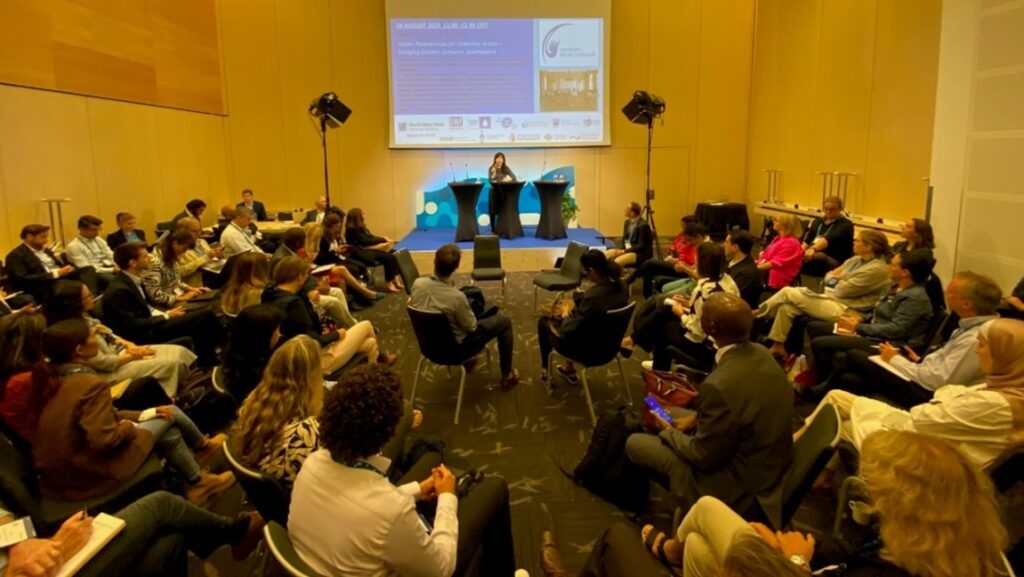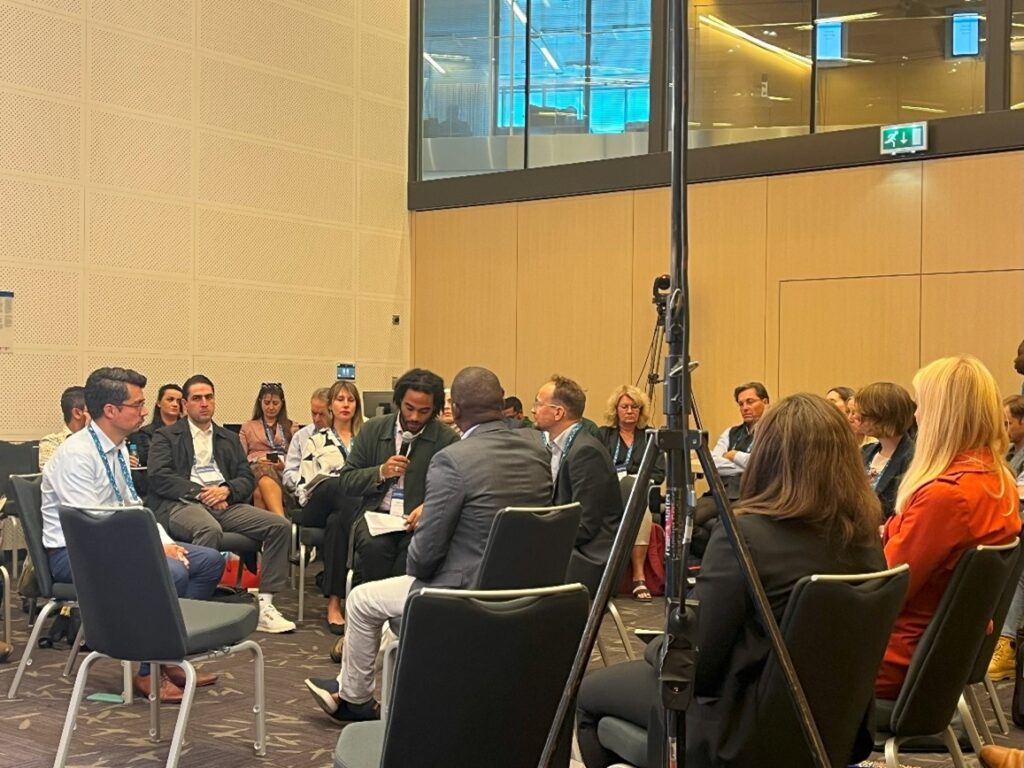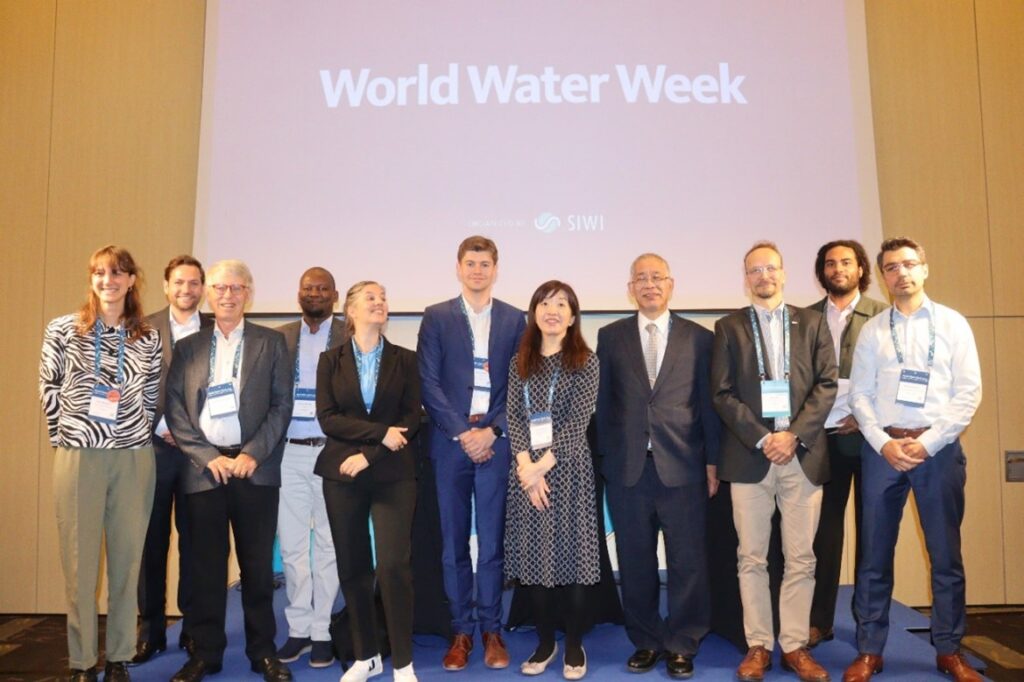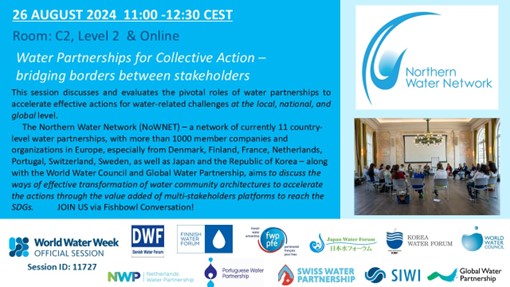Stockholm 2024 NoWNET Session
26 August (Mon) 11:00-12:30 CEST
Co-Convenors: Japan Water Forum / NoWNET Secretariat (lead convener), Danish Water Partnership, Finnish Water Forum, French Water Partnership, Korea Water Forum, Netherlands Water Partnership, Portuguese Water Partnership, Swiss Water Partnership, Swedish Water House (hosted by Stockholm International Water Institute) World Water Council, Global Water Partnership
Session Overview
This session explored the pivotal role of the Northern Water Partnership (NoWNET) in driving coordinated responses to water challenges at local, national, and global levels, through joint efforts involving the private and public sectors, civil society, and academia. Held as part of NoWNET’s 20th-anniversary celebrations, the session featured opening remarks by Mr. Loic Fauchon, WWC president, and a keynote presentation by Dr. Torkil, one of NoWNET’s founding members, who shared the rationale behind its establishment. Dr. Kenzo Hiroki, also a founding member, offered further remarks.
An interactive “fishbowl” dialogue fostered open discussions, engaging both in-person and online participants. NoWNET members and the audience reflected on their experiences and the lessons—both positive and negative—of collective action of multi-sectoral, trans-countries, and transgenerational partnerships.
The session concluded with a commitment to strengthen NoWNET’s impact and explore new avenues for collaboration in the years ahead.
- Discussion outcomes of the session
Firstly, Ms. Yumikko Asayama, Chief Manager, Japan Water Forum/ Secretariat of the Northern Water Network (NoWNET), introduced the objectives of this session and explained what NoWNET is.
NoWNET is a multi-stakeholder country network from Finland, France, Denmark, Netherlands, Swisstherlands, Sweden, Japan and Republic of korea, as well as World Water Council (WWC) and Global Water Partnership (GWP) that brings together government agencies, the private sector, academia, NGOs, and civil society to share knowledge and best practices. Recognizing that water issues are too vast for any one sector to tackle alone, the NoWNET aims to bridge gaps and mobilize resources, including human expertise, both locally and internationally.
Key objectives and activities of NoWNET include:
- Fostering collaboration between diverse stakeholders to address complex water challenges.
- Mobilizing knowledge, financial and human resources across countries to address water issues
- Sharing lessons learned and operational strategies through international conference and the network meetings.
- Supporting water-related issues in developing countries and contributing to the achievement of SDGs, particularly in the Global South.
The ideas to establish NoWNET revealed in 2003 during the 3rd World Water Forum in Japan and officially launched in 2004. The network has sustained its efforts with efforts and support from the member organizations.
This session is held as part of NoWNET’s 20th-anniversary celebrations. It reflected on two decades of accomplishments and shared experiences and explored new strategic directions for the future. We particulary aim to discuss the roles and values of NoWNET and how water partnerships like NoWNET can enhance collaboration and accelerate progress towards achieving the SDGs and beyond.
- Summary of Distinguished Opening Remarks by Loic Fauchon
It is great honor to be invited to speak before you today to celebrate the 20th anniversary of NoWNET. Thank you for allowing me to share some insights about the future of water, and make some proposals to contribute to the network’s future policy orientations.
The World Water Council is one of the founding members of NoWNET, a valuable network that aims to catalyze collective action based on real cooperation to promote water security.
Water security is essential for humanity’s survival, as life depends on access to clean water. Cooperation between countries, regions, and local authorities is critical to addressing water challenges, as politics will drive collaboration. Strengthening governance, innovation, and financing are crucial to securing water and sanitation for all and ensuring equitable development and peace.
With global challenges like pandemics, pollution, and resource scarcity escalating, we must understand the connections between water, food, energy, and education. Environmental considerations and nature protection must balance demographic growth and resource use.
Innovations in technology and engineering—such as desalination, wastewater reuse, and digital solutions—offer hope, but only if they align with sustainable, nature-respecting practices. To succeed, governments, communities, and sectors must unite and adopt both integrated water management and cross-sectoral cooperation, as outlined in the “Five Fingers Alliance” concept.
Together, we can create a sustainable future for all, prioritizing solutions that ensure peace, prosperity, and dignity for future generations.
- Keynote presentation
Dr. Torkil Jønch Clausen, International Water Advisor, delivered the keynote presentation NoWNET:- why and how was it born in 2003?” He served as the First Chair of the Danish Water Forum/ First Chair of GWP Technical Committee in 2003.
The 3rd World Water Forum in Kyoto highlighted the imbalance in water management knowledge exchange between the North and South. While the Global Water Partnership (GWP) existed in the South, no similar mechanism existed in the North. Recognizing the need for a Northern water network to share expertise, this idea gained momentum at the Rio+10 Summit in Johannesburg and was officially launched in Kyoto in 2003 with support from leaders such as former Japanese Prime Minister H.E. Mr. Hashimoto.
The network’s founding partners included the Netherlands, Australia, Denmark, the Japan Water Forum, the Swedish Water House, and the Korea Water Forum, among others. The goal was to create a multi-stakeholder, multi-sectoral partnership focused on international collaboration and promoting good water management practices through knowledge exchange.
Initially, the water sector was insular, with professionals mainly communicating within their field. Early efforts focused on mobilizing Northern countries to engage in knowledge-sharing, supported by the Japan Water Forum and the GWP, while contributing to global events like the World Water Forum. NoWNET website marked these initiatives’ beginning.
However, the world has changed significantly in the past 20 years. The traditional North-South divide has evolved, with emerging countries like China and India now taking leadership roles. Water issues are now part of a larger, interconnected global agenda, encompassing challenges such as climate change and biodiversity loss. The water community must now collaborate across sectors and regions to address these urgent challenges.
Looking ahead, the network is expected to continue adapting to these new realities, building on its 20 years of progress.
Remarkls by Dr. Kenzo Hiroki
First and foremost, my heartfelt congratulations to all of you for transforming this network into what it is today. Reflecting on NoWNET’s 20-year journey, seeing how far the network has come since its humble beginnings is remarkable. One of the network’s founding goals, as noted in 2003, was to empower the private and non-governmental sectors in water management, which was then dominated by the public sector, especially in North-South relations. At the time, government funding from the North flowed to the South, leaving little room for private sector involvement. However, early visionaries of NoWNET believed this was the wrong approach and foresaw a time when the private sector would play a more significant role, much like it already had in fields like IT.
NoWNET was created to empower private and non-governmental entities in the water sector and elevate the status of water professionals, even within large organizations where water departments are often small. The next step for the network’s growth could be organizing a high-profile summit, bringing together global leaders to elevate NoWNET’s visibility and influence. The private sector’s voice in water-related decision-making can be amplified by fostering these connections.
As the network celebrates its 20-year anniversary, it is crucial to reflect on its progress and look toward the future. To truly realize its potential, NoWNET needs a more proactive and agile secretariat to lead transformative change. If the network remains on its current trajectory, the progress over the next 20 years might be slow. However, with renewed commitment and innovative thinking, NoWNET has the potential to become a leading force in water sector decision-making for the years ahead.
- NoWNET’s transition
Ms. Yumiiko Asayama, NoWNET Secretariat, talked about the NoWNET’s transition through the recent activities.
NoWNET aims to learn among our network members how public and private partnerships have been working to address on-the-ground issues in developing countries, drawing lessons from both successful and less successful experiences worldwide. Our goal is to create and facilitate an enabling environment where all major stakeholders—particularly the private sector—can effectively plan and implement measures that enhance integrated water resource management (IWRM) through knowledge and experience sharing. When establishing this network, IWRM was primarily government-oriented, with limited involvement from non-governmental organizations (NGOs) in supporting government activities.
The situation has since evolved and become more complex. Now, NGOs can work alongside government organizations and the private sector, with support from scientific advisors in universities and research institutes. We strive to find synergies and balance trade-offs to ensure both single-issue solutions on the ground and mutual benefits among the collaborating organizations. Increasingly, we see partnerships that foster multi-stakeholder collaboration involving the private sector and youth participation—an emerging feature of our country-level partnerships even through our network activities.
Mr. Manuel Eckert, Programme Officer, SIWI, moderated the fishbowl dialogue onsite.
Ms.Michèle Heeb, Coordinator, Swiss Water Partnership, conducted the online moderator’s role.
Firstly, we introduced the featured network activities through our country partner organizations as a part of Fishbowl Dialogue.
Spotlight 1: SWP Sandec/Eawag (member of SWP)
Dr. George Wainaina, Sandec/Eawag discussed a partnership being developed in Kenya through the knowledge brokerage arm of Sandag, aimed at addressing local challenges by fostering collaboration across disciplines and sectors. Practitioners like NGOs, water utilities, researchers, and funders in Kenya often work separately without much interaction. This initiative, called Pray for WASH (Practice, Research, and Funding), seeks to unite these groups to create effective, localized solutions.
One pilot project involves Nakuru’s water utility, collaborating with universities, NGOs, and government agencies to develop a research agenda that aligns with local needs. The goal is to ensure that external researchers contribute to solving real problems rather than pursuing their own interests. This partnership promotes cooperation, streamlines activities, and creates a national model that can train other utilities. The effort aims to develop a collaboration framework and research agenda within six months, with avenues for funding already in progress. He emphasized the need for ongoing support and participation.
Spotlight 2: French Water Partnership (FWP): Mr. Joffrey LAPILUS,Programme officer, Water & Climate
FWP established in 2007, is a membership association bringing together various French water stakeholders, including national agencies, local authorities, private sector, NGOs, research institutes, and individual experts. Its key missions include international advocacy, knowledge exchange, and promoting French expertise in water management. FWP’s focus extends beyond water to issues like climate, biodiversity, agroecology, and WASH in humanitarian crises, emphasizing water’s role in achieving all SDG targets.
In recent years, FWP has expanded its partnerships to strengthen its advocacy by collaborating with the French Solid Waste Partnership, the French Partnership for Cities and Territories, and the French chapter of the World Energy Council. These partnerships focus on shared challenges like sanitation, urban water management, and the water-energy nexus. FWP aims to further develop cross-cutting collaborations internationally over the coming decades.
Spotlight 3: Finnish Water Forum (FWF), Dr Topi Helle, Managing Director
FWF was founded in 2009 to represent the Finnish water sector, encompassing both the public and private sectors. The goal was to involve these sectors in Finland’s international cooperation projects, leveraging our diverse expertise. Finland has consistently ranked high in global water statistics, and while we are not alone at the top, we share the number one position with other countries. He introduced the SPRING project, which is part of a European Union Horizon-funded initiative co-funded by India. The project involves seven research initiatives aimed at developing advanced oxidation systems and real-time monitoring tools to treat polluted water bodies in India. As part of this technical project, we created a similar organization to the FWF in India, the Indo-Nordic Water Forum. Its goal is to tackle global water challenges with a particular focus on India.
The challenge in India was to engage both the public and private sectors in these projects. Research projects often result in excellent technical solutions, but they struggle to implement them. The idea behind the Indo-Nordic Water Forum was to ensure these solutions are implemented after the research phase. So far, we’ve been quite successful, and today the Nordic Water Forum has over 75 members. We’ve also conducted several initiatives in India, including media outreach, web content, and two conferences in New Delhi. In addition, the embassies of Nordic countries in India have supported our efforts. In our view, this collaboration has been a great success.
Spotlight 4: Netherlands Water Partnership (NWP): Mr. Rick Elmendorp, Director & Chair
NWP is celebrating its 25th anniversary, having been founded following the first World Water Forum in Marrakesh, where the Dutch government and private sector recognized the need for greater collaboration in the water sector. Over the years, NWP has adapted to changing global contexts while maintaining its core mission of fostering collaboration within the water sector.
Initially focused on uniting stakeholders within the Netherlands, NWP expanded its influence globally, promoting the Dutch water sector and addressing increasingly complex challenges. The role of water partnerships has broadened to bridge not only public and private sectors but also generational and geographical divides. The traditional North-South dynamic has shifted; today, partnerships are based on cross-sectoral learning and collaboration.
Water partnerships like NWP give a collective voice to the entire sector, making their advocacy stronger and more impactful. Importantly, NWP remains neutral, representing the sector as a whole rather than individual interests, which enables it to partner with governments and execute programs effectively.
Key initiatives include the Water for Food Program, the Saline Water and Food Systems Network, and the Young Expert Program (YEP), which trains young professionals in water, agriculture, and energy sectors. As NWP reflects on 25 years of progress, it remains committed to evolving and addressing future challenges in the water sector.
Fishbowl dialogue, interacting with the audience
Mr. Manuel Eckert, Programme Officer, SIWI, firstly asked, “In your experience, both the good and the bad, what has collective action looked like in member partnerships, such as NoWNET, which are essentially partnerships of partnerships?”
Mr. Rick Elmendorp, NWP, answered that we tend to focus on our own countries as country partnerships. However, there’s a lot to learn from collaborating with others, and we can achieve much more by working together. I believe we have more in common than what divides us, that all water partnerships should unite collectively, especially as the global challenges become increasingly complex.
Mr. Joffrey LAPILUS, FWP add to the remarks. Beyond national water partnerships, we now have networks of networks, and we also participate in other international coalitions focused on policy, such as the Water for Climate Coalition under COP and UNFCCC processes. Being coordinated through Nelnet allows us to share unified messages and strengthen our position in these international coalitions. Our ability to gather diverse stakeholders and express the collective ideas of the sector, rather than individual organizations, makes us more influential in these global forums.
Dr Topi Helle, FWF: I agree. Having this network has been incredibly useful, especially given the enormous water sector challenges. We often can’t tackle these problems alone, so this network has been valuable for seeking help and involving more companies and research institutes in our projects. It’s a great asset.
Dr. George Wainaina, Sandec/Eawag: From the perspective of a network member within a larger supra-network, I’d say it’s about finding an anchor point within that bigger network. There are opportunities for amplifying messages and increasing impact. However, the challenge at every level is collaborating effectively and avoiding duplicating efforts. It’s about ensuring that these networks of networks are coordinated efficiently, allowing us to be more effective.
An intervention from onsite audience: We aim to foster cross-sector cooperation and promote collective action. Our initiatives, such as the “Journey for Water,” focus on engaging communities, including youth, policymakers, and the business sector, to address water issues on the ground and raise awareness.
We are also enhancing early warning systems to ensure stakeholders receive timely information, enabling preventive actions that reduce the need for reactive responses. This approach, alongside research and knowledge dissemination, emphasizes the precautionary principle, helping to mitigate disasters like landslides and droughts. Notably, early warning systems can reduce impacts by up to 30% when shared 24 hours in advance.
Recognizing the limitations of past efforts focused on policy negotiations through an Integrated Water Resources Management (IWRM) approach, we have shifted our focus to empowering communities to drive action. By building grassroots momentum, we are more effectively influencing political leaders and making IWRM more pragmatic and inclusive of local stakeholders. This shift has proven successful in creating lasting change.
Following the comment, Mr. Manuel, Eckert, Programme Officer, SIWI, the onsite fishbowl dialogue moderartor, asked whether there has been a specific response regarding partnerships, especially those focused on local initiatives, on-the-ground efforts, and cross-sectoral, integrated approaches
Mr. Rick Elmendorp, NWP, answeredthat when discussing cross-sectoral and integrated approaches, we often refer to sectors because they simplify categorization and understanding. However, effectively bridging these sectors remains a challenge. For instance, while World Water Week emphasized water, integrating it with other sectors like food and energy is still difficult. Nonetheless, aligning efforts when collaborations occur—such as with the Netherlands Food Partnership becomes easier.
Water often struggles to gain momentum on its own, but when linked to food or energy, governments and the private sector show greater willingness to invest in water initiatives. While challenging, working together across sectors, particularly with private financing and government support, can lead to successful long-term outcomes.
Ms. Yoonjin Kim, strategic director of WWC, asked the following question: I truly believe in the value of NoWNET collaboration in the water sector. I’d like to ask each organization how you are planning for deeper communication or collaboration with developing countries or partners outside of our NoWNET network. As we’ve just discussed, their practices could greatly enhance our awareness of situations beyond our current membership. This is just as important as our efforts toward cross-sectoral collaboration in the water field. I want to emphasize that this is a crucial element for our future growth. Are there any specific ideas or practices that your organization is currently planning or executing that could help shape our further discussions for development?
Dr Topi Helle, FWF answered that we are likely more active with organizations outside of NoWNET, focusing primarily on countries where Finland has had previous foreign cooperation projects. For example, we maintain close relationships with the Vietnamese Water Utility Association and the Association for Ukrainian Water Utilities. Additionally, we have ongoing contacts in Kenya, South Africa, and Egypt. It’s essential for us to understand the specific needs in these countries, as this knowledge helps guide our efforts.
Dr. Torkil Jønch Clausen asked the question. When IWRM became the fifth target of SDG 6, IWRM truly emerges as a cross-sectoral mechanism. Our challenge is not just within the water sector but lies in linking efforts across all the SDGs. My question for today’s partnerships is: when you look at your members, how many of them are actually working from the energy and the other sectors?
Mr. Rick Elmendorp, NWP, answered I don’t know the exact number offhand, but it’s only a few compared to the representation from the water sector. However, those few are quite active in the water-food or water-energy nexus. Cross-cutting collaboration across sectors typically happens through other partnerships—such as energy or food partnerships—with which we collaborate. These partnerships also have their own members, and close cooperation is essential. Otherwise, they remain separate entities that only talk to each other, rather than fostering meaningful collaboration.
What truly drives progress is when the members themselves engage directly with one another, turning conversations into real actions that create opportunities and tackle challenges. So, our collaboration largely happens with these other partnerships, and some of them are even members of our organization.
Mr. Vincent Cornelis, NWP, highlighted the importance of integrating water sector initiatives with other sectors like food and energy. He suggested that beyond participating in World Water Week, the water sector should actively engage in World Food and Energy Weeks, as water also plays a critical role in these areas.
Mr. Rick Elmendorp, NWP added and emphasized that the water sector must take action to collaborate with other sectors, citing NWP’s creation of the Dutch Marine Energy Council as an example of proactive collaboration to take action.
Mr. Jesper Goodley Dannisøe, Director of the Danish Water Forum, responded that creating networks across sectors is crucial, suggesting the formation of a simple shared resource library to disseminate knowledge on water management issues like groundwater and pipe systems. He also noted the importance of expanding partnerships, mentioning that there’s still a need to engage with large water partnerships, such as the German Water Partnership, to enhance collaboration. Jesper concluded by stating that sharing knowledge reduces duplication of efforts and benefits everyone involved.
Ms. Aloïs AGUETTANT, Programme Officer Biodiversity, NbS & Agroecology, French Water Partnership raised the issue of “bridging silos” not only between sectors like agriculture and energy but also across different scales of expertise within water partnerships. She asked if the Netherlands Water Partnership (NWP) faced similar challenges and how they resolved the difficulty of aligning various members—from local municipalities to international stakeholders—who may speak different “languages” in such settings.
Mr. Rick Elmendorp, NWP, answered that with over 180 members, we manage diverse perspectives by finding neutral, mutually agreeable themes. They empower relevant parties to represent their own voices for specific topics while maintaining a unified stance for the entire network.
An onsite audience raised the issue of data sharing, particularly between private and public sectors.
Mr. Rick Elmendorp, NWP noted that while NGOs and knowledge institutes freely share data, private companies are more hesitant due to competition. He suggested that creating “safe spaces” for collaboration is essential for encouraging data exchange in such competitive environments.
- Session Wrap up
Mr. Manuel, Eckert, Programme Officer, SIWI, firstly thanking our spotlight speakers and everyone in the audience, especially those who participated with their insightful contributions. This session has been an incredibly valuable, We reflected on NoWNET’s 20-year history and explored where we’re headed, what we need for the future, and how we can better collaborate across sectors. It was fascinating to hear how we can expand our boundaries, not just geographically but also regarding water management, and how to attract new members. I also appreciated the discussions about the diverse experiences within NoWNET, from the strategic level with our partnerships, down to individual members and how they contribute to the network’s overall value.
It was particularly encouraging to hear calls to action, emphasizing that while we’ve accomplished much, there is still more to do, especially in creating incentives for greater collaboration. The reminder that we have members of various scales, sometimes in competition, highlights the importance of incentive structures as a core element of these networks. This is essential for driving collective action.




(Reporter: Ms. Yumiko Asayama, Chief Manager, Japan Water Forum/ NoWNET Secretariat)
